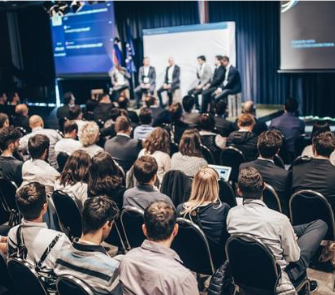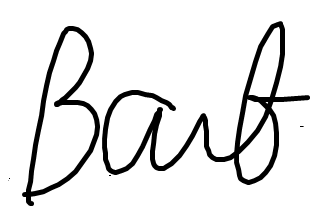|

Hi Barb,
Last month, I attended a national water science conference, my second big in-person meeting since 2020 when conventions suddenly had to jump online or die.
As an introvert, I tend not to like big meetings. I dislike small talk and how much energy it takes to connect to people. I get annoyed about acronyms and terms I don't know. The isolation. The feeling that I am not smart enough to be in the in-crowd. And so on.
But this meeting was about water science AND collaboration, right up my alley! Or should I say, right up my creek!
So I screwed up my courage, introduced myself to strangers, participated in workshops and once almost asked a question in a large plenary session. LOL.
There were things I really liked -- the online app, the poster sessions and workshops, for example. And, the presenters were given time limits that were enforced. YES.
But some of the same old things bothered me: the back-to-back data-rich presentations, the unreadable powerpoint slides, the difficulty of connecting with people, and more.
In my latest blog I suggest the first of several ways to uplevel conferences to be truly more collaborative.
And now, I get to practice what I preach, while in the thick of planning a three-day scientific meeting in October. Yes, there will be Liberating Structures, which solve many of the issues I decry. And yes, of course, some scientists resist changes to "how we do things."
What do you think could improve science conferences? or any large meeting? (say, 100 people or more) I'm on a mission to do what I can to make them truly collaborative for everyone who attends.
Will you please hit reply and share your ideas with me?
Warmly,

Barb Bickford
Better Conversations in Healthcare
Yes, I'm still working on improving communications in healthcare. Recently, I helped Judy Rees interview a facilities manager about how Clean Language helps him collaboratively solve problems with his staff who clean rooms, manage waste and prepare food in the hospital. You can watch the video here.
You may also want to join in this free event: Hearing what matters in healthcare: make Clean Language your superpower for person-centered practice It's a quick introduction to Clean Language on Monday August 5th, 8 to 9 AM Central US Time.
Beyond Bob: Min Specs for
Making Decisions in Small Governing Boards
-- online, Wednesday August 14, 2024, 5 PM Central Daylight Time
Many non-profit governing boards cite Roberts Rules as their standard for running meetings. But merely referring to Roberts Rules can create problems for a board that doesn't know how to use them well.
Join Daryl Yankee and me as we unpack this rule-bound topic. First, we’ll explore both the advantages and potential problems of using Robert's rules. Then, we'll use the Liberating Structure "Min Specs" to identify the absolute minimum rules needed for a small governing board to make decisions.
This is an experimental session hosted by the Washington DC Liberating Structures Community of Practice. All are welcome! Register here.
Recent blog posts
-- Rethinking Science Conferences: A Call for Change
-- Balancing Task and Group Focus
Our current workshops and courses
Beware of Yes
Chris Voss*, a former hostage negotiator with the FBI, offers a counterintuitive yet profound piece of wisdom for enhancing communication. It is to "Beware of Yes, Start with No."
At first glance, inviting a "no" seems to defy conventional efforts to achieve swift agreement, the infamous goal of "Getting to Yes." However, Voss’s principle digs deeper, advocating for authenticity and respect at the negotiation table -- and in meetings.
Emphasizing "no" liberates participants to share genuine thoughts and concerns, paving the way for conversations that are not just agreeable but truly meaningful. It gets you over the hump of resistance that shows up when people say "Yes" just to get you to go away.
When a person knows they can voice their true opinions -- their "No" -- without fear, then a person, whether a hostage negotiator or a meeting leader, can enter discussions that are enriched with honesty and diverse perspectives. This methodology doesn't just aim for agreement but champions a deeper understanding and collaboration.
When a client finally says "no" to me, I know we are getting somewhere! Now I can find out what is really important to that person or their group, and design a meeting that helps them get what they really want.
The path to "yes" begins with the courage and permission to say "no."
*Chris wrote the book Never Split the Difference: Negotiating as if your life depended on it. I highly recommend it.
Want even more tips? Access Ten Tips to Foster Online Engagement.
If you were forwarded this newsletter email, you may subscribe here.
You can also sign up for topics you want to hear more about.
Photo Credit:
|